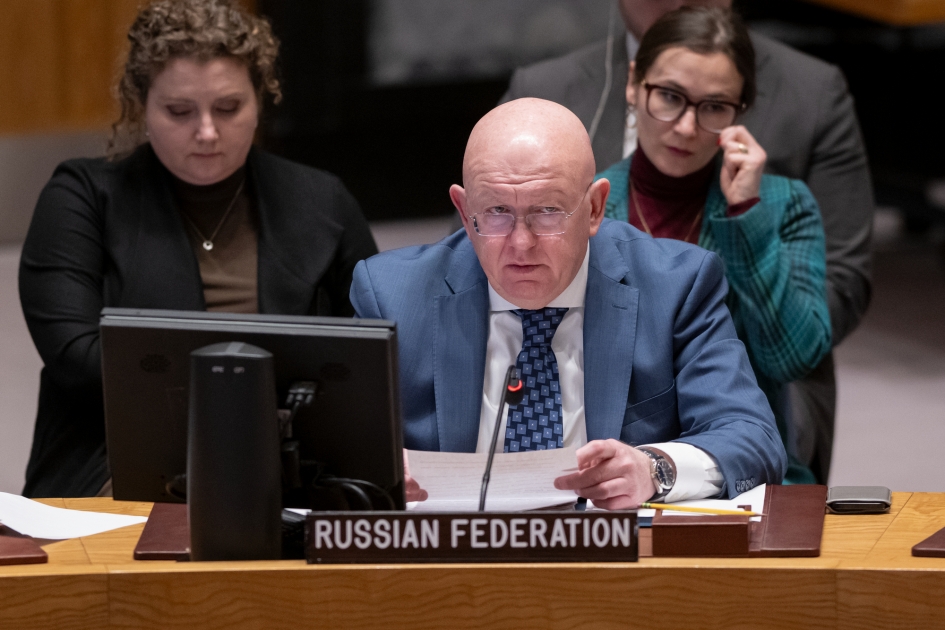Statement by Permanent Representative Vassily Nebenzia at UNSC briefing on Afghanistan
Mr.President,
We thank SRSG of the Secretary-General and Head of UNAMA, Ms.Roza Otunbayeva and OCHA Operations Director, Mr.Rajesh Rajasingham, for their assessments of the situation in Afghanistan. Russia supports the activities of the UN Mission under your lead and within the framework of its mandated tasks. We note the interest of Kabul in developing contacts with you. We welcome the commitment of the UN to maintaining its presence in and providing assistance to the people of Afghanistan.
We have followed closely the statements by Chair of Security Council 1988 Sanctions Committee on the Taliban Movement, the Permanent Representative of Ecuador, Mr. José de la Gasca, and the representative of civil society, Ms. Shaharzad Akbar. We are pleased that regional actors have also been given the floor in the discussion today.
We have taken note of the report of the Secretary-General on the situation in Afghanistan and would like to make the following points.
It has been more than two years since the Taliban came to power. Despite loud talk from Western colleagues about a likely collapse, Afghanistan has survived. In the face of unprecedented unilateral sanctions and a humanitarian crisis, the country has not descended into another civil war or turned into a "black hole". More than 1.3 million IDPs have returned to their homes. These figures are unprecedented. However, given the scale of challenges, threats and problems that foreign troops left behind after their flight, Afghan people need our sustained assistance and support more than ever.
We have repeatedly said that Afghanistan needs a realistic and comprehensive approach. An approach that would make it possible to put aside all egoistic interests and focus closely on the needs of the Afghans, while relying on sober-minded assessments of the situation on the ground and on the readiness of the de facto authorities to respond adequately to the expectations of the international community. We can see that they remain interested in developing broad and pragmatic cooperation. At the same time, it is clear that progress is hardly possible if some Western donors continue to place all responsibility solely on the Taliban, demanding that they fulfill their obligations. How many more years will have to pass before you admit that threats, pressure and blackmail are neither effective nor inefficient? In the current circumstances and without constructive countermeasures on your part, it is a dead-end track.
We share the Secretary-General's separate assessments of the situation in the country. Despite the efforts of the de facto authorities, we remain particularly concerned about security risks, including those caused by the terrorist activities of ISIL-Khorasan and associated FTFs, which have strengthened their influence. We see that the terrorists continue to perturb the situation, seeking to pose as a real alternative force and undermine stability in Afghanistan's neighboring states. It is obvious that the Taliban's actions are not enough to completely destroy terrorists. Meanwhile, the prospect of terrorist activity spilling over beyond Afghan borders into Central Asia remains quite real.
The drug problem is also closely linked to terrorism. We are convinced that there are no alternatives to comprehensive international and regional assistance in eradicating this threat, including through UNODC. Making this assistance more robust and consistent also is a necessity. Another matter of concern is production of synthetic drugs.
We pay close attention to the humanitarian and socio-economic situation in the country. We note the efforts being made by the United Nations and regional organizations to provide humanitarian assistance to Afghanistan. We commend the contribution of humanitarian agencies and their personnel, who are ready to remain on the ground and help Afghans under any circumstances. It is clear, however, that these measures are not enough. There is a need to abandon the politicization of humanitarian aid, unfreeze assets and expand assistance with a view to the subsequent economic recovery of Afghanistan.
We also continue to monitor the situation with regard to the rights of all Afghans in general, including the universal rights of women and girls to education and labor. We take note of the statements by the de facto authorities and expect a speedy resolution of those problems. Other imperatives include the formation of a truly inclusive government with the participation of all ethnic and political groups in the country. We expect to see progress at this track too.
Mr.President,
Russia fully supports the right and the desire of the Afghan people to live in peace and stability. Order in the region also depends on that. However, this long-term and sustainable peace is impossible to build without a patient and pragmatic engagement with the de facto authorities on a wide range of issues. There are no alternatives to this path. We believe that the effective implementation by UNAMA of its tasks also depends on adherence to a comprehensive approach.
In that connection, we welcome the efforts of Special Coordinator Sinirlioglu to prepare an independent assessment report on Afghanistan, including his emphasis on the imperative of establishing an all-encompassing dialogue with the de facto authorities on the basis of a comprehensive approach to resolving all the pressing issues. The rapid resolution of the current impasse and the subsequent international reintegration of Afghanistan will depend on the coordinated and coherent actions of all players. It is encouraging that many of the ideas set out in the report echo the general approaches of the regionals to Afghan settlement, including those voiced by the members of the Moscow format on Afghanistan.
In conclusion, I would like to commend the UAE and Japan for their tireless efforts as informal penholders of the Afghan file in the Security Council.
Thank you.
